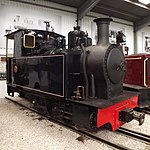|
St. Nicholas Abbey Heritage Railway
St. Nicholas Abbey Heritage Railway (SNAHR) is a 1.5 kilometres (0.9 mi) long heritage narrow gauge railway with a 2 ft 6 in (762 mm) gauge, in the parish of Saint Peter on the Eastern Caribbean island of Barbados.[2] HistoryThe railway was conceived and financed by Barbadian architect Larry Warren, the current owner of the St Nicholas Abbey estate, and completed in 2018. Operations were inaugurated on 21 January 2019, with a diesel service, the steam locomotive still undergoing a major rebuild and overhaul at that time. The formal opening ceremony was performed on 11 March 2019 by the Prime Minister of Barbados, Mia Mottley, who ceremonially tolled a locomotive bell preserved on the site, and originally attached to one of the Baldwin Locomotive Works steam engines which operated the national Barbados Railway network following its re-gauging to 2 ft 6 in (762 mm) gauge, and which operated from 1883 to 1937, but was dismantled during the second world war. SNAHR has the same 2ft6in gauge as the earlier Barbados Railway. It was built in a project with a budget of 2 million Barbados Dollars (1 million US dollars, 0.86 million €). It employs up to 15 full-time staff, for which 700 applications were originally received.[3] RouteThe heritage railway runs on a balloon-shaped track from St Nicholas Abbey to the panoramic view point Cherry Tree Hill. It offers locals and tourists, including cruise ship passengers, a ¾ hour long train ride, including a stop to enjoy the panorama overlooking the sea. The railway is designed to provide a family day-out for general tourists, but also a specialist experience for railway enthusiasts, with short lectures on Barbadian railway history offered (as an optional attraction) during the stop at Cherry Tree Hill, where volunteers are also recruited to assist in turning the locomotive on the manually operated turntable.[3][4] The main loop encircles an ornamental lake. The loop and the incline up to Cherry Tree Hill are connected by a triangle of track, permitting various permutations of operational route. The main engineering and stock storage sheds are located alongside St Nicholas Abbey station. There are three stations on the line:
Rolling stockLocomotivesMost of the tourist trains are hauled by one of the railway's historic steam locomotives. No 5 is a Mallet locomotive (a type of steam engine with an articulated main frame, enabling operation on tight radius track), built in 1914 by the Arnold Jung locomotive works in Germany, and operated as No. 5 at the Ceper Baru Sugar Mill in Central Java, Indonesia. From there it was sold to Graham Lee at the Statfold Barn Railway.[5] After a complete overhaul and rebuild it was delivered to Barbados on 7 February 2019. The Jung maker's build number is 2279, but it also carries maker's plate number 651 of Statfold Engineering Limited, having been comprehensively rebuilt in 2018. It is normally pre-heated using a coal fire in the morning, but fired with both coal and wood during operation.[3] No 6 is an 0-4-0T locomotive built by La Meuse (works number 3243 of 1926) which was constructed for light industrial shunting on the internal rail network of SA Hoboken in Antwerp, Belgium. The engine moved in preservation to the Welshpool and Llanfair Light Railway, and later the Statfold Barn Railway. From there it was sold to St Nicholas Abbey Heritage Railway, being relocated to Barbados in 2020. Additionally two historic Hudswell Clarke 0-6-0DM diesel locomotives are in service, hauling passenger trains in low-season service, or when the steam locomotives are unavailable. The Hudswell Clarke diesels provided all motive power when the line was first opened for several weeks, until the first steam locomotive was available for service. For track inspection a smaller Simplex diesel-mechanic locomotive is available.
Passenger vehiclesFor passenger transport three wheel chair accessible railway carriages are in use, which have verandahs at both ends, and a loudspeaker system through which the conductor provides a live commentary on the outward leg of the journey. The sound system can also play a pre-recorded multi-lingual narrative when non-English-speaking passengers are carried. Each of the carriages can accommodate up to 40 passengers.[1]
Engineering vehiclesA number of freight vehicles are available, chiefly for engineering purposes. These include:
References
External links
|
||||||||||||||||||||||||||||||||||||||||||||||||||||||||||||||||||||||||||||||||||||||||||||||||||||||||||||||||||||||||
Portal di Ensiklopedia Dunia






